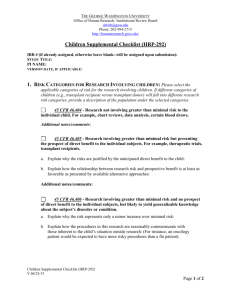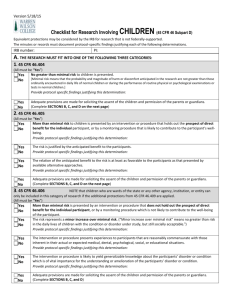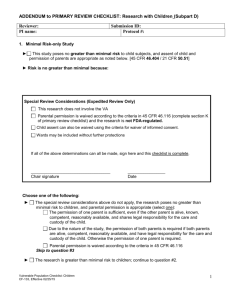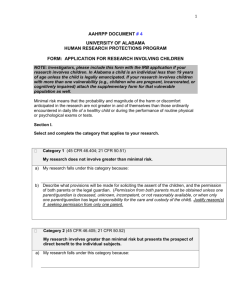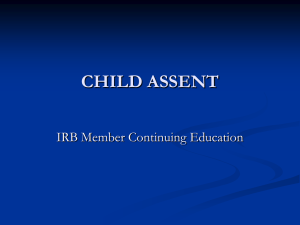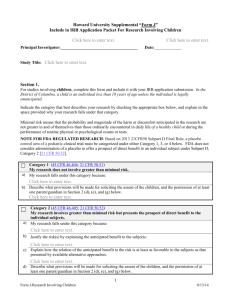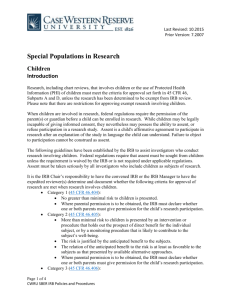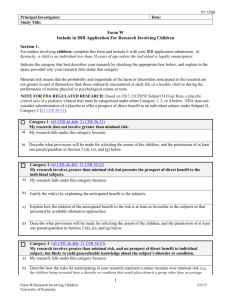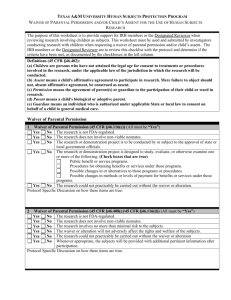and 21 CFR 50 the IRB makes the following findings re: Children
advertisement
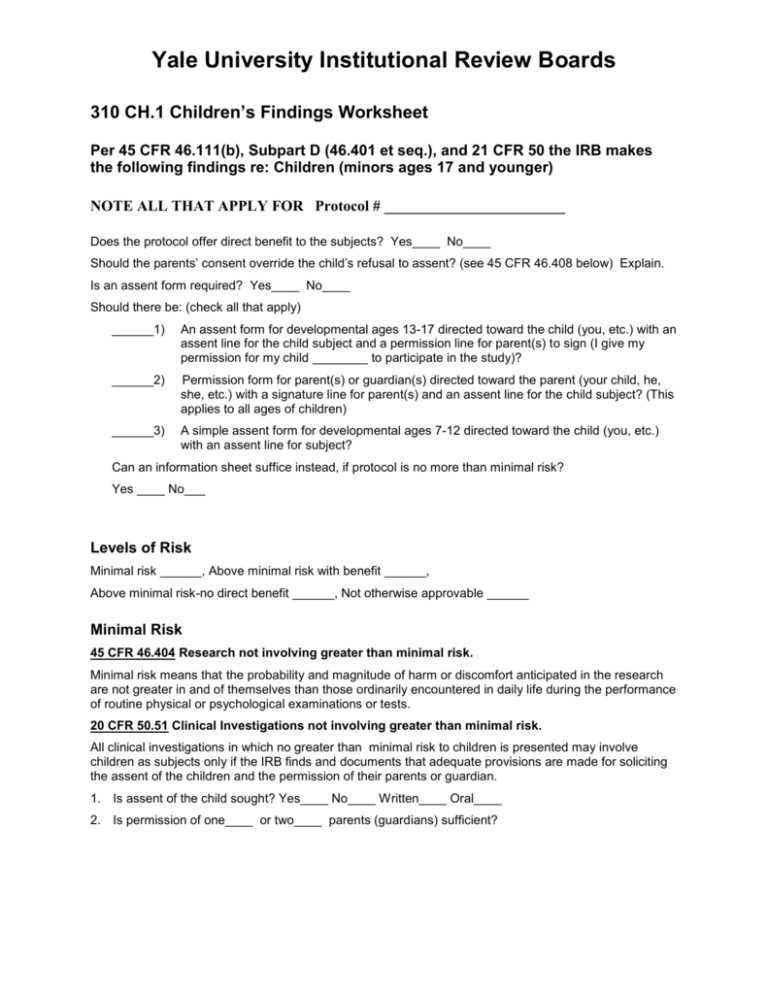
Yale University Institutional Review Boards 310 CH.1 Children’s Findings Worksheet Per 45 CFR 46.111(b), Subpart D (46.401 et seq.), and 21 CFR 50 the IRB makes the following findings re: Children (minors ages 17 and younger) NOTE ALL THAT APPLY FOR Protocol # ________________________ Does the protocol offer direct benefit to the subjects? Yes____ No____ Should the parents’ consent override the child’s refusal to assent? (see 45 CFR 46.408 below) Explain. Is an assent form required? Yes____ No____ Should there be: (check all that apply) ______1) An assent form for developmental ages 13-17 directed toward the child (you, etc.) with an assent line for the child subject and a permission line for parent(s) to sign (I give my permission for my child ________ to participate in the study)? ______2) Permission form for parent(s) or guardian(s) directed toward the parent (your child, he, she, etc.) with a signature line for parent(s) and an assent line for the child subject? (This applies to all ages of children) ______3) A simple assent form for developmental ages 7-12 directed toward the child (you, etc.) with an assent line for subject? Can an information sheet suffice instead, if protocol is no more than minimal risk? Yes ____ No___ Levels of Risk Minimal risk ______, Above minimal risk with benefit ______, Above minimal risk-no direct benefit ______, Not otherwise approvable ______ Minimal Risk 45 CFR 46.404 Research not involving greater than minimal risk. Minimal risk means that the probability and magnitude of harm or discomfort anticipated in the research are not greater in and of themselves than those ordinarily encountered in daily life during the performance of routine physical or psychological examinations or tests. 20 CFR 50.51 Clinical Investigations not involving greater than minimal risk. All clinical investigations in which no greater than minimal risk to children is presented may involve children as subjects only if the IRB finds and documents that adequate provisions are made for soliciting the assent of the children and the permission of their parents or guardian. 1. Is assent of the child sought? Yes____ No____ Written____ Oral____ 2. Is permission of one____ or two____ parents (guardians) sufficient? 310 CH.1 – Children’s Findings Worksheet Above Minimal Risk with Benefit 45 CFR 46.405 Research involving greater than minimal risk but presenting the prospect of direct benefit to the individual subjects. 20 CFR 50.52 Clinical investigations involving greater than minimal risk but presenting the prospect of direct benefit to the individual subject. Any clinical investigation in which more than minimal risk to children is presented by an intervention or process that holds out the prospect of direct benefit for the individual subject or by a monitoring procedure that is likely to contribute to the subject’s well-being may involve children only if the IRB finds and documents: 1. Is the risk justified by anticipated benefit? Yes____ No____ 2. Is the risk/benefit ratio at least as favorable to subjects as available alternatives are? Yes____ No____ 3. Is assent of the child sought? Yes____ No____ If so, is the form adequate and explicit for the age group? Yes____ No____ 4. Is permission of one___ or two___ parents (guardians) sufficient? Above Minimal Risk – No Direct Benefit 45 CFR 46.406 Research involving greater than minimal risk and no prospect of direct benefit to individual subjects, but likely to yield generalizable knowledge about the subject’s disorder or condition. 20 CFR 50.53 Clinical investigations involving greater than minimal risk and no prospect of direct benefit to individual subjects, but likely to yield generalizable knowledge about the subject’s disorder or condition. Any clinical investigation in which more than minimal risk to children is presented by an intervention or procedure that does not hold out the prospect of direct benefit for the individual subject or by a monitoring procedure that is not likely to contribute to the well-being of the subject, may involve children as subjects only if the IRB finds and documents: 1. Does the risk represent a minor increase over minimal risk? Yes____ No____ 2. Does the research intervention present experiences that are reasonably equivalent to those in their actual or expected medical, dental, psychological, social or educational situations? Yes____ No____ 3. Is the information being obtained of vital importance for the understanding of the subject’s condition or disorder? Yes____ No____ 4. Is assent of the child sought? Yes____ No____ If so, is the form adequate and explicit for the age group? Yes____ No____ Permission is to be obtained from both parents unless one parent is deceased, unknown, incompetent or not reasonably available or when only one parent has legal responsibility for the care and custody of the child. Not Otherwise Approvable 45 CFR 46.407 Research not otherwise approvable which presents an opportunity to understand, prevent or alleviate a serious problem affecting the health or welfare of children. 1/12/09 Page 2 of 4 310 CH.1 – Children’s Findings Worksheet 1. Does the study present an opportunity to understand, prevent or alleviate a serious problem affecting the health or welfare of children? Yes____ No____ The IRB refers research in this category to the Secretary of DHHS, who then consults with experts to make a decision and posts the determination in the Federal Register for public comment. 20 CFR 50.54 Clinical investigations not otherwise approvable that present an opportunity to understand, prevent or alleviate a serious problem affecting the health or welfare of children. If an IRB does not believe that a clinical investigation involving children as subjects meets the requirements of the previous Secs. 50.51, 50.52, and 50.53, the investigation may proceed only if: The IRB finds and documents that the clinical investigation presents a reasonable opportunity to further the understanding, prevention or alleviation of a serious problem affecting the health or welfare of children; and The Commissioner of Food and Drugs, after consultation with a panel of experts in pertinent disciplines and following opportunity for public review and comment, determines either: 1) That the clinical investigation in fact satisfies the conditions of Secs. 50.51,50.52 and 50.53 as applicable or 2) That the following conditions are met: (i) the clinical investigation presents a reasonable opportunity to further the understanding, prevention or alleviation of a serious problem affecting the health or welfare of children; (ii) the clinical investigation will be conducted in accordance with sound ethical principles; and (iii) adequate provisions are made for soliciting the assent of children and the permission of their parents (guardians). Reconsent at the Age of Majority The IRB should consider whether it is necessary or appropriate to obtain the renewed signed consent from the child subject when he/she reaches the age of majority. Considerations include: 2. What is the risk level of the study? ___________ 3. Is the study longitudinal, and is continued active participation of the subject necessary? Yes____ No____ 4. Will study data or samples obtained from the subject continue to be used under the existing parental permission (and child assent)? Yes____ No____ 5. If so, is withdrawal of data or samples possible? Yes____ No____ Waiver of Consent or Assent 45 CFR 46.408 Requirements of permission by parents or guardians and for assent by children. 21 CFR 50.55 Requirements of permission by parents or guardians and for assent by children. Waiver of Assent: 46.408 and 50.55(c) Assent can be waived if the capability of the child(ren) is so limited that they cannot be reasonably consulted or that the intervention or procedure involved in the research holds out a prospect of direct benefit to individual subjects that is important to their health and well-being; OR 1/12/09 Page 3 of 4 310 CH.1 – Children’s Findings Worksheet 46.116(c) The research focuses on public benefit or services & is subject to approval or direct supervision of state or local government officials AND to get assent/consent would make the research impracticable OR 46.116(d) and 50.55(d) The research is minimal risk; waiver won’t hurt the rights or welfare of the child subject; assent would make the research impracticable; and subjects will get extra information after participating, whenever appropriate. Waiver of Parental Permission 46.408 If it is determined that parental or guardian permission is not a reasonable requirement to protect the child subject (i.e., neglected or abused children), parental permission may be waived provided an appropriate mechanism to protect the child subject is substituted and provided that the waiver is consistent with Federal, State or Local law. 46.116(d) research is minimal risk; waiver won’t hurt rights or welfare of subject; parental permission would make the research impracticable, and child subjects/parents will get extra information after participating, whenever appropriate. Wards Does this protocol intend to enroll child subjects that are wards of the State? Yes_____ No_____ Children who are wards of the State or any other agency, institution or entity can be included in research that is approved by the IRB as minimal risk. They may also participate in research considered greater than minimal risk when the research has the potential to provide direct benefit to the ward. Special restrictions apply to research above minimal risk with no direct benefit (45 CFR 46.406/21 CFR 50.53), or research otherwise not approvable (45 CFR 46.407/21 CFR 50.54): 46.409(a) and 50.56(a) Wards. (a) Children who are wards of the state or any other agency, institution, or entity can be included in research approved under 46.406 or 46.407 (21 CFR 50.53 or 21 CFR 50.54) only if such research is: 1) Related to their status as wards; or 2) Conducted in schools, camps, hospitals, institutions, or similar settings in which the majority of children involved as subjects are not wards. (b) If the research is approved under paragraph (a) of this section, the IRB shall require appointment of an advocate for each child who is a ward, in addition to any other individual acting on behalf of the child as guardian or in loco parentis. One individual may serve as advocate for more than one child. The advocate shall be an individual who has the background and experience to act in, and agrees to act in, the best interests of the child for the duration of the child's participation in the research and who is not associated in any way (except in the role as advocate or member of the IRB) with the research, the investigator(s), or the guardian organization. 1/12/09 Page 4 of 4
